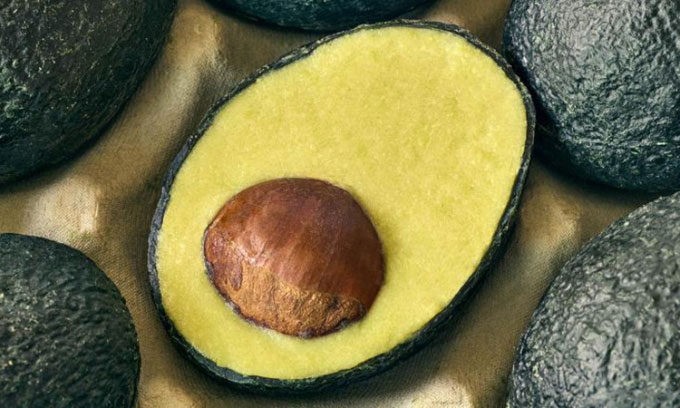Researchers make real edible fake butter
Dubbed "green gold", avocados have become very popular in recent years. According to estimates by the World Economic Forum (WEF) in 2020, the world consumes about 5 billion kg of avocado annually. However, this comes at a high cost to the environment: about 2,000 liters of water are used to grow just one kilogram of avocado, and forests are also cleared to make land for avocados, CNN reported on August 12.

Ecovado looks a lot like a real avocado.
British researcher Arina Shokouhi has developed a "fake avocado" to replace real and more environmentally friendly avocados called Ecovado. She hopes it will inspire people to think twice before cutting avocados to use on toast or make avocado sauce.
At first glance, it is difficult to distinguish Ecovado from the real thing. Ecovado shell made with beeswax and natural food coloring contains charcoal powder and spinach. The pulp is made from 4 simple ingredients: peas for base, apple for freshness, cold pressed canola oil for creaminess and a hint of hazelnuts. A whole chestnut or hazelnut is used as a nut butter.
Shokouhi teamed up with Jack Wallman, a food scientist at the University of Nottingham, to develop Ecovado. Wallman studied the molecular properties of avocados to find out what gives the fruit its creamy, creamy texture.
Horseradish differs from butter in molecular structure and it is difficult to mask their "bitter smell". However, after a while of research, the team of experts also found a way to balance the ingredients and create a good quality butter substitute. Shokouhi said it took the team eight months to perfect the formula.
Shokouhi hopes Ecovado will bring health and environmental benefits because it is locally sourced food. Horseradish beans are relatively easy to grow in the UK, with around 740,000 tonnes harvested in the country each year.
Shokouhi's products received interest from a number of potential investors. She is still perfecting Ecovado and hopes it will be sold in supermarkets for the same price as real butter. Shokouhi also experimented with Japanese edamame beans. She thinks it is possible to produce Ecovado in more countries using different local ingredients in the future.
"The taste may not be 100% like real butter, but that's not too important, as long as you can still eat it with bread, it looks like butter, delicious and healthy," she shared.
- What does butter make and all the knowledge about butter
- Distinguish edible and non-edible mold
- The process of making butter
- Tips to distinguish wine, real beer - fake when used
- How to distinguish real milk and very good fake milk
- Instructions on how to distinguish the most real and fake cosmetics
- How to recognize real honey, fake honey
- Tips to speed up the ripening butter for 10 minutes
- How to recognize fake beef with just one sheet of paper, everyone can do it
- How to identify fake gas, poor quality gas
- Tips to help you distinguish true and fake Nike shoes in a standard way
- Can turn peanut butter into diamond
 Why do potatoes have eyes?
Why do potatoes have eyes? 'Tragedy' the world's largest carnivorous life: Death becomes ... public toilet
'Tragedy' the world's largest carnivorous life: Death becomes ... public toilet Tomatoes were once considered 'poisonous' for 200 years
Tomatoes were once considered 'poisonous' for 200 years Detecting microscopic parasites on human face
Detecting microscopic parasites on human face